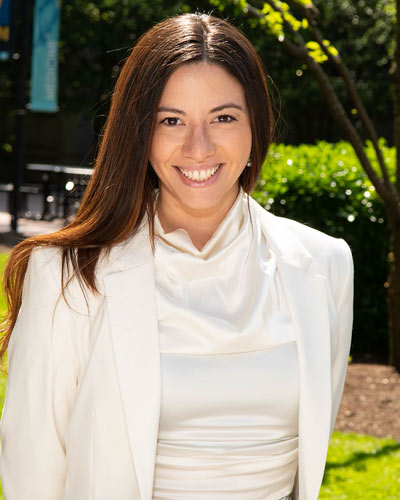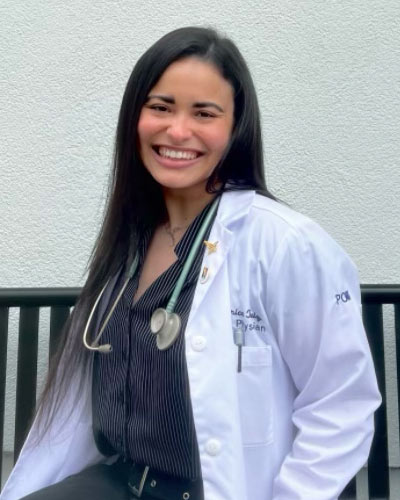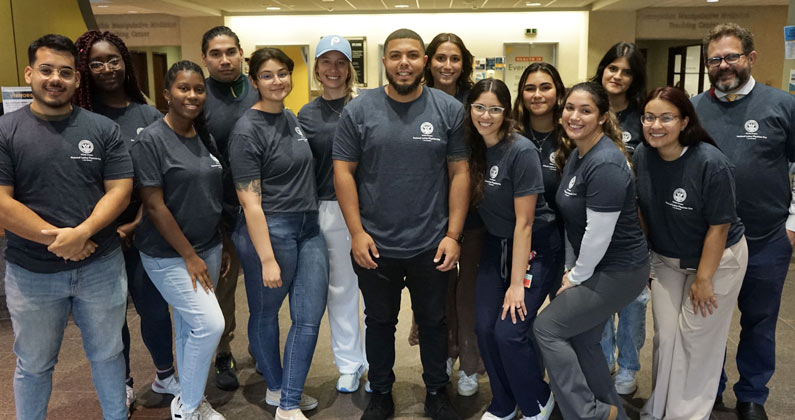'It’s Not Common to See Us': Paving the Way Is Bittersweet
Hispanic Heritage Month
October 11, 2023 “Growing up, if you got sick, your grandma would put some herbs in a tea,” Maria Pazan
Avellan (DO ’26) says with a smile as she reflects on her early years in Ecuador.
“Growing up, if you got sick, your grandma would put some herbs in a tea,” Maria Pazan
Avellan (DO ’26) says with a smile as she reflects on her early years in Ecuador.
“Our wellness visit was going to a guy in the barrio who said ‘you should take this’.
I don’t even think he was a real doctor.”
Back then, the thought of becoming a physician was elusive to her. She wondered if a career in medicine was possible. The answer
was yes.
At 32 years old, Pazan Avellan began medical school at PCOM.
“It makes me feel very proud and happy, but also lonely because there’s not many of
us in medicine,” she said. “It’s bittersweet, but I’m hopeful that at some point the
path will open up for many other Latinos.”
 Others like Veronica Ruiz (DO ’26), who believes humble beginnings are nothing to
be ashamed of.
Others like Veronica Ruiz (DO ’26), who believes humble beginnings are nothing to
be ashamed of.
“I wouldn’t be here without the sacrifices of my ancestors,” she said.
“My grandmothers were housewives and maids, my grandfathers were farmers, and my parents
worked factory jobs. While those might be deemed stereotypical Latino jobs, I’m proud
of my Puerto Rican heritage.”
For Ruiz’s family, there was always an interest in medicine, but financial obstacles
stood in the way.
“My grandma wanted to be a nurse and was accepted into school in Puerto Rico,” she
shared. “She went, but was removed from the program because she couldn’t afford to
continue paying tuition.”
Many years later, Ruiz’s mother turned down a medical assistant position to become
a secretary. In this role, which she took in order to secure benefits for the family,
she herniated seven discs in her spine. Being the only child, Ruiz took the lead in
providing care for her mom at just seven years old.
“After one of her eight back surgeries, my mom was fighting a life-threatening MRSA
infection, ” said Ruiz. “A nurse showed me how to push mom’s IV antibiotics and clean
her wound. Through this experience, I fell in love with not only medicine but also
the act of helping others.”
Even after going through difficult times, Ruiz wouldn’t change a thing about her past.
“Life will take you to places you won’t imagine,” she said. “But I think what happened
to my mom happened so I could get into the medical field. Since then, my passion for
medicine has become so strong.”
Now, both in their second year at PCOM, Ruiz and Pazan Avellan have fostered an environment
of inclusivity as leaders of PCOM’s Latino Medical Student Association (LMSA).
Nearly 50 years ago, Hispanic and Latino medical students yearned for a space to feel supported while
in school, so they created it themselves. Five regional organizations were founded,
and in 2009 they merged to create one unified group known today as LMSA.
PCOM’s chapter hosts year-round events that highlight Hispanic and Latino culture, customs, and accomplishments. Members
also give back to the community by making treatment more accessible to patients.
“Sometimes there’s too much pride and distrust to go see a doctor,” said Pazan Avellan.
“Latinos tend to self-manage their own ailments and not seek professional care. Having
physicians that look and speak like them will break down those barriers, potentially
saving more lives.”
As Hispanic Heritage Month comes to an end, both students are grateful for the opportunity
to celebrate their culture and the moments that led them to PCOM.
“This journey wasn’t smooth sailing,” Ruiz shared. “Latinas only make up 2.4% of physicians
in the United States. It’s not common to see us, but let’s make it common. Our communities
need us.”

From September 15 to October 15, PCOM joins others around the country in observing
Hispanic Heritage Month. This important celebration honors the histories, cultures
and contributions of Hispanics and Latinos everywhere. At PCOM, we recognize our faculty,
students and staff who identify as Hispanic or Latino and will highlight their stories
throughout the month.
About Philadelphia College of Osteopathic Medicine
Established in 1899, Philadelphia College of Osteopathic Medicine (PCOM) has trained
thousands of highly competent, caring physicians, health practitioners and behavioral
scientists who practice a “whole person” approach to care—treating people, not just
symptoms. PCOM, a private, not-for-profit accredited institution of higher education,
operates three campuses (PCOM, PCOM Georgia and PCOM South Georgia) and offers doctoral degrees in clinical psychology, educational psychology, osteopathic
medicine, pharmacy, physical therapy, and school psychology. The college also offers
graduate degrees in applied behavior analysis, applied positive psychology, biomedical
sciences, forensic medicine, medical laboratory science, mental health counseling,
physician assistant studies, and school psychology. PCOM students learn the importance
of health promotion, research, education and service to the community. Through its
community-based Healthcare Centers, PCOM provides care to medically underserved populations.
For more information, visit pcom.edu or call 215-871-6100.
Contact Us
For general media inquiries, please contact the Office of Marketing and Communications
at 215-871-6300 or communications@pcom.edu. Visit our media relations page to view contact information for public relations personnel.
Connect with PCOM

 “Growing up, if you got sick, your grandma would put some herbs in a tea,” Maria Pazan
Avellan (DO ’26) says with a smile as she reflects on her early years in Ecuador.
“Growing up, if you got sick, your grandma would put some herbs in a tea,” Maria Pazan
Avellan (DO ’26) says with a smile as she reflects on her early years in Ecuador. Others like Veronica Ruiz (DO ’26), who believes humble beginnings are nothing to
be ashamed of.
Others like Veronica Ruiz (DO ’26), who believes humble beginnings are nothing to
be ashamed of.
